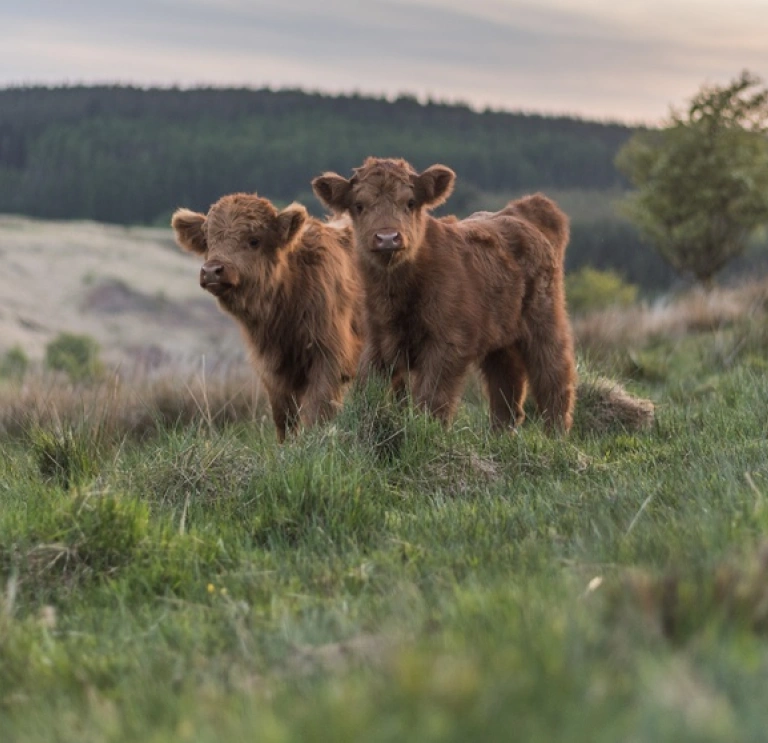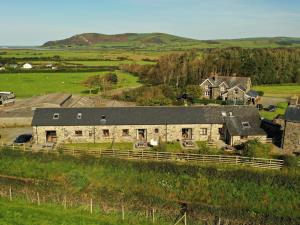The majority of farms in Wales are small, family-owned livestock farms, and many have diversified by offering a range accommodation options.
Choose from converted barns, cosy cottages and historic farmhouses, with activities on offer from sheep trekking to tractor driving.


Stay at a traditional Welsh farm
Immerse yourself in the life of a traditional Welsh-speaking family farm. More often than not you’ll be staying in the original farmhouse, and fed local and home-produced food. What better place to find out about the history, culture and language than with a croeso cynnes Cymreig – a warm Welsh welcome!
Dolgelynen
Dolgelynen sheep and dairy farm is on the north bank of the river Dyfi, between Machynlleth and Aberdyfi. Stay in the B&B in the oak-beamed farmhouse, and enjoy local breakfast and an inside view into the life of the farm.
Nantgwynfaen Organic Farm
Nantgwynfaen Organic Farm near New Quay in Ceredigion pride themselves on serving up a breakfast of free-range eggs, own-recipe sausages, dry-cured bacon, and homemade bread and marmalade, and sell everything and more in the on-site organic farm shop too.
Tal-y-Bryn Farmhouse
16th century Tal-y-Bryn Farmhouse in the Vale of Clwyd in North Wales is part of the farm that makes Llaeth y Llan yoghurt, available throughout Wales, and on guests’ breakfast table! They also find time to keep their beautiful garden’s terraces and fountains in award-winning condition.
Bach y Graig Farm
For a farmhouse stay with breathtaking history, stay at Bach y Graig Farm, near St Asaph in Denbighshire, North Wales. It was the first brick building in Wales, built in 1567 and once visited by Dr Samuel Johnson. Wander through one of Wales’ oldest documented woodlands, which was part of Edward the Black Prince’s royal hunting forest in the 14th century.
Hendy Farm Holidays
Hendy Farm Holidays near Tywyn in south Eryri (Snowdonia) has the novelty of its very own steam railway halt, on the Talyllyn Railway. Choose from farmhouse bed and breakfast or a stay in a self-catered cottage. Guests are welcome to wander the 250-acre farm, and the sandy beach is a short walk away. Pets are welcome too.


Abbey Farm
Ideal for a relaxing family or couples break, Gold Award-winning Abbey Farm has a choice of hand-crafted glamping pods, tourer pitches and camping spots. If you can tear yourselves away from the wandering sheep and cows, and maybe the odd alpaca, Rhuddlan and its castle are only a short walk away. Dogs are welcome too - the resident hounds are always up for a run around!
If you fancy getting even closer to the land, many glamping holidays in Wales are on working farms. The farming life doesn’t traditionally include hot tubs or massages, but if they’re on offer, why not? Choose from these luxury Welsh glamping experiences.
To be sure of getting involved on the farm, you could opt for one of the farmstays that offer experiences.
Sheep trekking, lambing and shearing
Aberhyddnant Organic Farm
There may be a fair few sheep in Wales (11 million sheep compared to three million people!) but rarely can you get close enough to the bashful creatures to give them a cuddle. Not so at Aberhyddnant Organic Farm in the Brecon Beacons, where guests or day visitors can tramp across the hills with their trekking Jacobs or pamper their extremely friendly and fluffy Valais Blacknose sheep or diddy Pygmy goats.
If you're curious about the grittier side of farming, at Eastertime visitors can experience the realities of lambing. Participants learn about caring for pregnant sheep, identifying labour, and most likely witness a live birth or two. You can even help if you want to! Shorter lambing sessions for under 12s give children an opportunity to connect with the farming cycle too. Summer guests can try sheep shearing, and the farm also offer felting craft days.
The farm has self-catering barns and glamping tents too, and many of the experience days include a farmhouse meal, or buy eggs and organic pork, beef or lamb to take home and cook for yourself.
Treberfedd Farm
If you're smitten and want to learn about the next step in shepherding, Treberfedd Farm near Lampeter offer one-day sheep-keeping courses for smallholders. Participants can learn all about health, housing and feeding, with advice on which breeds would best suit land and lifestyle.



Tractor-driving and farm walks
David’s Organic Farm
Guests to Gwarmacwydd, also known as David’s Organic Farm, in Whitland, Carmarthenshire, are encouraged to get involved with the fun side of farming – collecting the eggs and bottle-feeding the pet calves and lambs in spring. The 450-acre organic beef farm on the banks of the River Taf is self-sufficient, growing its own peas and oats for animal feed. Organic farms have up to 50% more wildlife, they say, and their farm walks will give you a good chance to spot your wild neighbours, and hear more about their healthy farming practices. Visitors are also free to wander where they will, including down to their two miles of riverbank for a spot of fly fishing, with sewin, salmon and trout for the catching.
Once you’ve had your fill of serenity, you can learn to drive a great big John Deere tractor. The hour-long one-to-one sessions get you quickly behind the wheel and learning techniques.
Biodiversity projects
Many people and organisations in Wales are working hard on finding ways to make farming as biodiverse and nature-friendly as possible.
Llechwedd Einion Cottages
Llechwedd Einion Cottages sit between Cefn Coch farm and the Cambrian Wildwood land, in the UNESCO Dyfi Biosphere. Host, farmer and PhD ecologist Joe can show guests his land and you can feed his highland cattle and learn about low-intensity, nature-friendly agroforestry.


The cottages are right next to the Cambrian Wildwood, where a degraded upland farm is being experimentally regenerated through mostly hands-off means – learn about the ecological restoration so far. Events and volunteering are also offered at the Wildwood, including tree-planting and dawn chorus breakfasts.

Denmark Farm
Denmark Farm near Lampeter in Ceredigion, is an old mixed farm that became a conservation centre in 1987. Since then the land has been managed for the benefit of nature, continuing many of the practices of traditional land-friendly farming. Visitors can have a go through volunteer days, or courses in conservation, crafts and sustainable living.
Read more: For other eco holiday options in Wales try these sustainable holidays or eco retreats.










